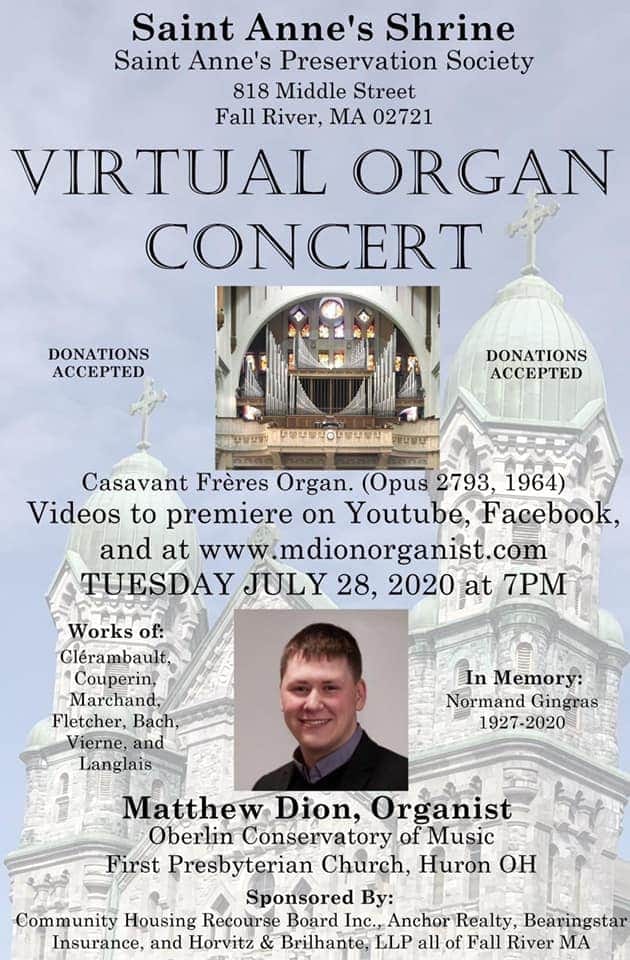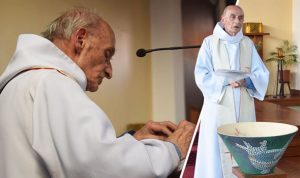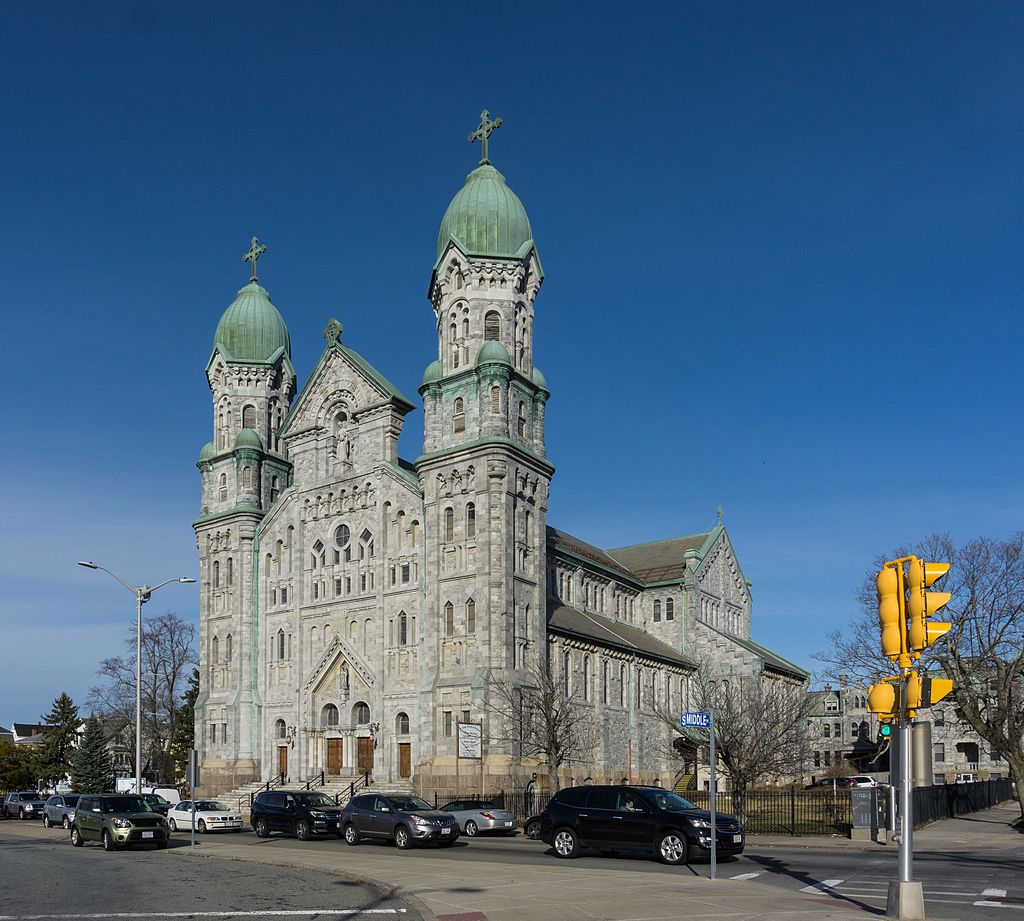Charles Cole on The World Over
Charles Cole, director of the London Oratory Schola Cantorum, was interviewed by EWTN’s Raymond Arroyo this week concerning singing in the time of the Coronavirus. He is doing important work in getting choirs to sing again.
CMAA President William Mahrt tells us that Charles is working with a committee of the CMAA to establish a statement of what needs to be done, as an answer to the negative statement of the NATS and the ACDA.
Casavant 2793 plays again
The Saint Anne Shrine Preservation Society, a lay association working to preserve and fully reopen the former Dominican shrine in Fall River, Massachusetts, took a step forward this week when they presented a organ recital on the Shrine’s Casavant, Opus 2793.
Matthew Dion, a organ student at Oberlin, has been working with organist and organ builder Bro. Roger Chingas, FSC, to tune and make some minor repairs to the organ, which had been largely idle and unmaintained since the upper church was closed in 2015. The instrument was dedicated in 1964 with a recital by Jean Langlais, and one of the works from that program was included in this week’s recital.
A few days ago Dion recorded these pieces, and they were streamed with live introductions on Tuesday. Times within the video are indicated, with links to the works.

6:32: L.N. Clérambault: Grand plein jeu from the Suite du 1. Ton
12:29: François Couperin: an excerpt from the Messe pour les Couvents
15:09: Louis Marchand: Grand Dialogue
26:32: Percy Fletcher: Fountain Reverie
31:07: J.S. Bach: Prelude and Fugue in a minor
43:50: Jean Langlais: Trois méditations sur la Sainte Trinité: 1. Le Père
48:23: Jean Langlais: Pasticcio
54:40: Louis Vierne: Clair de lune from the 24 Pièces de Fantaisie
1:03:20: Jean Langlais: Te Deum from the Trois Paraphrases Grégoriennes
The full concert video is available here.
(Photo credit: by Kenneth C. Zirkel, via Wikimedia)
PS: I updated this post on July 31 to credit Brother Chingas, whose name I first omitted. Sorry for the lapse! Congratulations to him and Matthew Dion on the fine sound their work produced.
The source of our peace
God is in His holy place,
God Who unites those who dwell in His house;
He Himself gives might and strength to His people.
Guerrilla warfare
I’ve been reading Bevin Alexander’s interesting book, How Wars Are Won. He tells of several different tactics that are incredibly effective in warfare. One of them that is being used against the Catholic Church at the moment is Holding One Place, Striking Another. In this tactic, an army is forced into committing its resources to defense in one place, leaving itself vulnerable to attack in another place.

This has happened to the Church before, and for similar reasons: the Church is currently fighting in the press for its validity as a moral voice, given some corruption that has plagued her from within.
As everyone who is close to the Church knows, the corruption is nowhere near the main story of the Church, and is in fact part of the story of every institution involving fallen humanity. However, at the moment it is the part of the story that is most widely known. It is exacerbated not only from without but from within, by those who are building careers on criticizing the Church.
While the Church spends resources defending her virtue and her credibility to speak as a moral voice, and while burdened with the enormous strain of the coronavirus problem, she is under a true, astonishingly brazen and widespread attack.
Statues too numerous to recount, and too shocking to reprint, have been vandalized in a Cromwellian orgy of iconoclasm, led by both neo-communist cancel culture activists and satanists.
So how do we win this war?
One tactic can be taken from yesterday’s Office of Readings, the attack on Jehosaphat by three armies, from 2 Chronicles 20. The attackers are not at peace with one another, and are already destroying one another. No group of revolutionaries is at peace for long. Judah needed only to fast, pray, and stand firm.
Another effective tactic suggested by Bevin Alexander is the Feigned Retreat. Withdrawing in an orderly fashion and regrouping, an army draws a pursuing enemy forward in disorder, leaving them vulnerable to effective counterattack. For us as Catholics, this counterattack takes several forms, all of them works of mercy. I would suggest that the very first is a vigorous teaching of the Gospel in all its fullness–because our victory will be complete when our enemies become our friends, and friends of God.
This is an election year in the United States, and one of the concerns is that an oppressive regime, opposed to religious freedom, may ascend. That would indeed be tragic, but it is important to recall that the Lord was born under Herod the Great and rose under Pontius Pilate. The word of God is not chained.
Ten days after the martyrdom of the Martyrs of Compiègne, the Reign of Terror ended. Hopefully most of us will not have to be heroes in the same way, but we can make our contributions. We have the weapons of the divine Holy Spirit, Who cannot fail, and Who manifests His presence in many ways:
- The bishop who rallies his diocese and his brothers, and preaches with fire.
- The priest who through many distractions turns to his breviary first of all, every day.
- The wife who makes do with less.
- The husband who listens and consoles, protects and encourages.
- The church musicians who have begun preparing for Christmas, not at all sure their jobs will last that long.
- The penitent who confesses the same sin of weakness again and again, trusting in the graces of forgiveness and healing.
Intro to Singing the Propers
Luke Massery gives us the basics and provides links to free resources.
Ecumenism, ancient and new
The patristic reading from today’s Office of Readings is beautifully appropriate for this anniversary of Summorum Pontificum.
The Pope Emeritus has added many treasures to the Tradition. Currently I am reading his catecheses on St. Paul, and I feel that if this were his only contribution, it would be of immense importance. However, it was not his only contribution, and thankfully among all the rest, he has left us an example of a new ecumenism–which, when reading St. Augustine, we realize is a retrieval of something venerably old.
Those then who tell us: You are not our brothers, are saying that we are pagans. That is why they want to baptize us again, claiming that we do not have what they can give. Hence their error of denying that we are their brothers. Why then did the prophet tell us: Say to them: You are our brothers? It is because we acknowledge in them that which we do not repeat. By not recognizing our baptism, they deny that we are their brothers; on the other hand, when we do not repeat their baptism but acknowledge it to be our own, we are saying to them: You are our brothers.
If they say, “Why do you seek us? What do you want of us?” we should reply: You are our brothers. They may say, “Leave us alone. We have nothing to do with you.” But we have everything to do with you, for we are one in our belief in Christ; and so we should be in one body, under one head.
There are those who, though in some sense one with us, are out of communion with us. How do we restore communion? By making paths of restoration.
Those who are attached to older usages, both the Sarum and the preconciliar expressions of the one sacrifice of Christ, have now a path to full communion with the see of Peter. Full justice is given to everyone in this type of ecumenism, which seeks unity according to the Lord’s prayer on the night He was betrayed, and according to His example of solidarity with the human race while remaining true to His divine nature.
These paths of reconciliation are not easy: they do not brush away the real difficulties. But they are righteous and true. And here I am reminded of the words of the Pope Emeritus, when taking on the responsibilities of the shepherd, in his inaugural homily:
Here I want to add something: both the image of the shepherd and that of the fisherman issue an explicit call to unity. “I have other sheep that are not of this fold; I must lead them too, and they will heed my voice. So there shall be one flock, one shepherd” (John 10:16); these are the words of Jesus at the end of his discourse on the Good Shepherd. And the account of the 153 large fish ends with the joyful statement: “although there were so many, the net was not torn” (John 21:11). Alas, beloved Lord, with sorrow we must now acknowledge that it has been torn! But no – we must not be sad! Let us rejoice because of your promise, which does not disappoint, and let us do all we can to pursue the path towards the unity you have promised. Let us remember it in our prayer to the Lord, as we plead with him: yes, Lord, remember your promise. Grant that we may be one flock and one shepherd! Do not allow your net to be torn, help us to be servants of unity!

